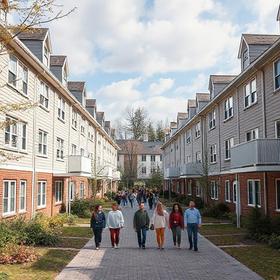First of all, let's define competitive. At its most basic level, a competitive boarding school is one that admits fewer applicants than it receives applications from. For example, a school has a fixed admissions deadline of January 31 each year. Last year it received 250 applications for 100 places. That means that 150 applicants were not accepted by the school. Perhaps some of them were put on the waiting list but we will look at that later.
So, essentially a competitive boarding school receives more applicants than it has places which it can offer to those applicants. Within the scope of competitive schools are several subsets. There is nothing official here, of course, as no organization will officially state that such and such a school is a highly competitive school or a less competitive school and so on. Having said that, you do not have to know a lot about private schools to look at the data which our site Boarding School Review offers after doing a little sorting of acceptance rates.
The other filter which we have to apply is for admissions to special schools. These schools which specialize in teaching students with learning disabilities, for example, have acceptance rates that are generally subject to other variables. In most cases, we will classify these as non-competitive.
So, where are we going to set the bar? Anything below a 25% acceptance rate is very competitive. 26-50% is competitive. 51-75% is less competitive. Individual educational consultants will have their own scales against which to measure how competitive schools are.
This video offers a look at Middlesex School, Concord, Massachusetts.
Why are you only looking at very competitive schools?
The answer to this question drives the rest of this discussion. Applying only to very competitive schools is frankly a risky proposition in my opinion. The reason why is that there are just too many variables to make such a strategy a sound one when it comes to boarding school admissions. Do you know what the applicant pool looks like in any given year? Are you privy to the school's admissions criteria for the year in which your child is applying? You do not have access to the admissions office's confidential files and data. So, you are gambling if you think your son or daughter is just as well-qualified as the other top applicants.
The better, safer strategy is to apply to one very competitive boarding school. It's a long shot but you and your consultant determine that it is worth doing. Part of that strategy is then applying to two or three other boarding schools which are less competitive so that you have a very good chance at being accepted at one or two schools.
This is the same balanced approach to choosing boarding schools as you ultimately use when you and your child begin to think about colleges. Yes, getting into Harvard or Princeton would be super, but there are hundreds of other colleges which are not Harvard or Princeton which will provide an excellent education for your child.
This video offers a look at The Orme School, Mayer, Arizona.
What are your criteria for looking at schools?
The answer to this next question drives the entire boarding school process as far as I am concerned. What are your expectations? What are you hoping the school can and will accomplish? Do you see where I am going with this? Not one mention of competitive admissions is there. Instead what we parents have to do, and it is a tough thing to do, is to find the schools which are the best fit for our requirements. We know our children better than any school. We have a pathway to adulthood laid out in broad terms. Our selection of the right boarding school must be driven by a combination of these long-term and short-term objectives.
The other factor which is always lurking in the background is that our adolescent children are changing almost daily. What they thought in grade 8 would be cool to be when they grew up will change as they enter 9th and 10th grades. That's why it is so important to focus on the right fit for your child. Find schools which will encourage your child to be all she can be. Choose a school with a caring, nurturing environment that will develop her confidence. Choose a school with the kind of faculty and staff who will make her feel that she can do anything which she decides she wants to do. And do it to the best of her ability.
These factors trump the focus on getting into a competitive boarding school.
Explore all the possibilities.
When you truly explore all the possibilities, you might well find yourself outside your personal comfort zone. The boarding school which seems to have everything you want is located in another part of the country. It is a 2 hour plane trip from your hometown. Should you cross it off your shortlist? I suggest that you keep it on your shortlist. Thoroughly explore the transportation options available to you. It might not be as scary as you thought. Finally, you have to come to terms with the reality that your child may decide to go to university on the other side of the country anyway. Or for that matter, she may decide to study abroad. Sending your child off to boarding school will eliminate much angst when she heads off to college. "Been there, Mom! Done that, Dad!" I am not saying it is easy for us parents to send our children off to boarding school. But deal with it. You will find that the payoff is a rich one.
This video features a welcome from the head of the Woodside Priory School, Portola Valley, California.
Choose a blend of schools.
This is the very essence of choosing a boarding school. Assuming everything else is working in your favor, choose a blend of schools from competitive to not very competitive. Don't forget that you will have to visit schools. During the visit, you and/or the school's admissions staffers may decide that this is just not a good fit from your perspective and from theirs. But since you have a couple more schools to visit, all is not lost. Accept the realities of the situation. No need to blame yourself or the school. It just was not a good match.
Avoid being locked out of schools you like.
Good grades certainly will help. Being able to do the academic work at the school is a major plus in your child's admission folder. Boarding schools move at a much faster pace than public schools do. Admissions testing will confirm what your child's transcripts already indicate.
Starting the boarding school search process as early as possible also helps. Beginning a full 18 months before the fall of the year your child plans to be in schools sounds like way too much lead time. But it really isn't. By the time you have explored dozens of options online and then visited 3 or 4 schools, you will be amazed at how quickly that 18 months goes by. Suddenly you are staring at a bunch of admissions deadlines that you thought were next year but are actually in two months.
Questions? Contact us on Facebook. @boardingschoolreview













